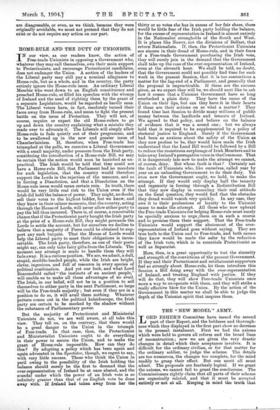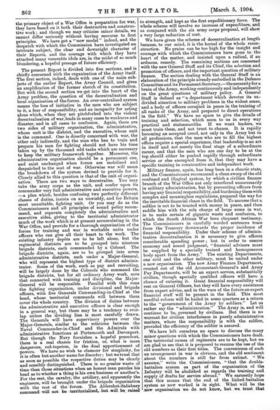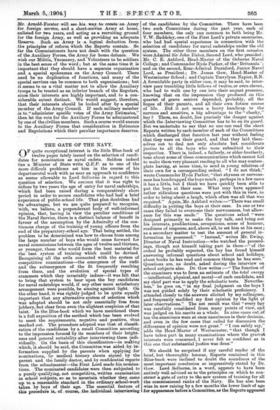HE "NEW MODEL" ARMY.
LORD ESHER'S Committee have issued the second part of their Report, and the boldness and thorough- ness which they displayed in the first part show no decrease in the present instalment. First we had the axioms which were held to govern all reform and the broad lines of reconstruction ; now• we are given the very drastic changes in detail which their acceptance involves. It is difficult for the ordinary civilian, or for that matter for the ordinary soldier, to judge the scheme. The details are too numerous, the changes too complete, for the mind readily to grasp their effect. But one merit all must admit. The proposals are fearlessly logical. If we grant the axioms, we cannot fail to grant the conclusions. The Commissioners rightly claim that all parts of their scheme are organically related, and that it must be accepted entirely or not at all. Keeping in mind the truth that the primary object of .a War Office is preparation foe war, they have based on it both their destructive and construc- tive work ; and ,though we may criticise minor details, we cannot differ seriously without having recourse to first principles. We have got a "new model" indeed, and the despatch with which the Commission have investigated an intricate subject, the clear and downright character of their Reports, and the courage with which they have attacked many venerable idols are, in the midst of so much blundering, a hopeful presage of future efficiency.
The present Report is divided into five sections, and is chiefly concerned with the organisation of the Army itself. The first section, indeed, deals with one of the main sub- jects of the earlier Report, the• Army Council, and gives an amplification of the former sketch of its constitution. But with the second section we get into the heart of the Army problem, the question of the decentralisation and local organisation of the forces. An over-centralised system means the loss of initiative in the men who are subject to it, a fear of responsibility; and an incapacity for acting alone which, when they are pitchforked into the violent decentralisation of war, leads in many cases to weakness and disaster, and in all cases to confusion. Again, there are two sides of military organisation, the administrative, whose unit is the district, and the executive, whose unit is the command. One is directly concerned with war, the other only indirectly, and the man who has to train and prepare his men for fighting should not have his time taken up by the thousand odd tasks which are necessary to keep the military framework together. Moreover, the administrative organisation should be a permanent one, and exist unchanged when forces are mobilised and despatched to the seat of war. Otherwise war will mean the breakdown of the system devised to provide for it. Closely allied to this question is that of the unit of organi- sation. There are two ways to decentralise. You may take the army corps as the unit, and confer upon its commander very full administrative and executive powers, —a plan which, besides confusing two perfectly different classes of duties, insists on an unwieldy, and for Britain most unsuitable, fighting unit. Or you may do as the Commissioners and all principles of sound policy recom- mend, and separate completely the administrative and executive sides, giving to the territorial administrator much of the work which is at present accumulating in the War Office, and provide for a thorough organisation of the forces for training and war in workable units under officers who can give all their heart to the work. The existing infantry depots are to be left alone, but the regimental districts are to be grouped into nineteen brigade districts, each commanded by a Colonel. The brigade districts, again, are to be grouped into seven administrative districts, each under a Major-General, who will represent the highest type of district adminis- trator. Some of the work, such as pay and recruiting, will be largely done by the Colonels who command the brigade districts, but for all ordinary Army work, save that connected with training and discipline, the Major- General will be responsible. Parallel with this runs the fighting organisation, under divisional and brigade officers, with five Generals Commanding-in-Chief at the head, whose territorial commands will between them cover the whole country. The division of duties between the administrative and executive officers is clear enough in a general way, but there may be a tendency to over- lap unless the dividing line is most carefully drawn. The Generals will have supervisory powers over the Major-Generals, similar to the relations between the Naval Commander-in-Chief and the Admirals with administrative functions at Portsmouth and Devonport. But though the Navy furnishes a hopeful precedent, there is a real chance for friction, or, what is more dangerous, red-tapeism, in the dual apportionment of lowers. We have no wish to clamour for simplicity, for it is often but another name for disorder ; but we trust that as soon as possible the respective duties may be clearly and sensibly distinguished. There is no greater waste of time than those situations when an honest man puzzles his head as to whether a thing is his own business or another's. For the rest, the cavalry, the artillery, and apparently the engineers, will be brought under the brigade organisation with the rest of the forces. The Aldershot-Salisbury command will not be .territorialised, .but will. be raised to strength, and kept as the first expeditionary force. The whole scheme will involve no increase of expenditure, and as compared with the six army corps proposal, will show a very large reduction of cost.
We have given the scheme of decentralisation at length because, to our mind, it is the kernel of the whole recon- struction. No praise can be too high for the insight and courage with which the Commissioners have gone to the heart of the matter, and insisted upon a radical, if an arduous, remedy. The remaining sections are concerned with the new General Staff and its Chief, the selection and promotion of officers, and the important question of military finance. The section dealing with the General Staff is an elaboration of the principle already embodied in the Defence Committee and its Permanent Secretary,—the necessity for a brain of the Army, working continuously and independently on the great questions of military policy. A General Staff is defined as "a department which devotes its un- divided attention to military problems in the widest sense, and a body of officers occupied in peace in the training of all ranks of the Army, and prepared to direct operations in the field." We have no space to give the details of training and selection, which seem to us in every way practical and statesmanlike. If we want leaders, we must train them, and not trust to chance. It is rapidly becoming an accepted creed, not only in the Army but in all professions, that the men who are to fill the highest offices require a special experience, that leadership is an art in itself and not merely the final stage of a subordinate career, and that the men who are one day to be at the top should either be pushed rapidly through subordinate service or else exempted from it, that they may have a specific training in constructive and independent work.
Military finance, again, has long been in a chaotic state, and the Commissioners recommend a clean sweep of the old confused and illogical system, by which a civilian finance branch of the War Office not only interfered unnecessarily in military administration, but by preventing officers from having any financial responsibility, and burdening them with complex and meaningless regulations, prepared the way for the inevitable financial chaos in the field. To assume that a soldier is not to be trusted with money in peace, and then saddle him with the sole charge of large sums in war, is to make certain of gigantic waste and confusion, to which the South African War bore eloquent testimony. The Commissioners in carefully worded sentences trace from the Treasury downwards the proper incidence of financial responsibility. Under their scheme of adminis- trative decentralisation it is necessary to give officers considerable spending power ; but in order to ensure economy and sound judgment, "financial advisers must be supplied by a specially trained and homogeneous body apart from the Army." The existing Departments, une civil and the other military, must be united under a new organisation. The new Army Finance Department, created out of the old Accountant-General's and Army Pay Departments, will be an expert service, substantially civilian, though specially qualified officers will have a chance of entering it. Great financial responsibility will rest on General Officers, but they will have every assistance from expert advice, and in the wars of the future an expert financial staff will be present in the field. This most needful reform will be hailed in some quarters as a return to the "government of the Army by soldiers." Let us rather say the "administration." The Army is, and will continue to be, governed by civilians. But there is no warrant for civilian interference in purely administrative matters, where the responsibility is with the soldier, provided the efficiency of the soldier is assured.
We have left ourselves no space to discuss the many minor questions with which the Commissioners have dealt. The territorial names of regiments are to be kept, but we are glad to see that it is proposed to resume the use of the old numbers as their first titles. The convenience of such an arrangement in war is obvious, and, the old sentimmit about the numbers is still far from extinct. "We assume," write the Commissioners, "that the double- battalion system as part of the organisation of the Infantry will be abolished as regards the training and supply of drafts for service abroad." We earnestly, hope that this means that the end of the linked-battalion system as now worked is in sight. What will be the .new organisation we do not know, but we trust that Ir. Arnold-Forster will see his way to create an Army for foreign service, and a short-service Army at home, enlisted for two years, and acting as a recruiting ground for the foreign Army, as well as providing an adequate Reserve. Such an Army is a logical deduction from the principles of reform which the Reports contain. So far the Commissioners have not dealt with the question of the Auxiliary Forces, the Army for home defence. We _wish our Militia, Yeomanry, and Volunteers to be soldiers in the best sense of the word; but at the same time it is important that they should have a separate organisation and a special spokesman on the Army Council. There need be no duplication of functions, and many of the special services can be common to both organisations ; but it seems to us a vital matter not to allow the Auxiliary troops to be treated as an inferior branch of the Regulars, since their interests are highly important, and to a con- siderable extent distinct. We would suggest, therefore, that their interests should be looked after by a special member of the Army Council. If each military member is to." administer specific votes of the Army Estimates," then let the vote for the Auxiliary Forces be administered by one of the civilian members. Such a course would ensure to the Auxiliary Forces that consideration in Estimates and Regulations which their peculiar importance deserves.
THE GATE OF THE NAVY.












































 Previous page
Previous page